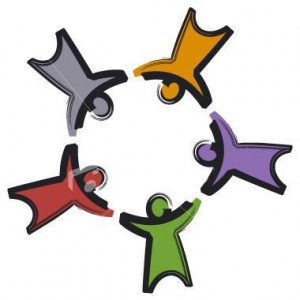For decades I’ve heard Barbra Streisand’s voice crooning out words I know to be true: “People, people who need people, are the luckiest people in the world.” Of course, I think that people needing people aren’t just lucky; they’re human. I think we all need other people. We all need community.
Religious folk like to call this “fellowship.” In Christian traditions, we talk about the need for church. Thus, the season of Pentecost is about more than holy spirits and speaking in tongues. It is also about the beginning of the church. Acts 2:44-46 describes it succinctly:
And all that believed were together, and had all things in common
And sold their possessions and goods, and parted them to all, as everyone had need
And they, continuing daily with one accord in the temple, and breaking bread from house to house, did eat their food with gladness and singleness of heart.
Every socialist bone in my body wants to decry this the appropriate model for church and society. But I can’t claim that’s the intent of the passage. What I see here is community as it should be: everyone has what she needs; there’s a sense of spirituality, shared worship, good food, and good conversation.
It sounds simple, but anyone who has attended church or any place of worship in a religious tradition knows that it’s not. This is not an indictment of what’s wrong with today’s religious communities. It’s an acknowledgement that healthy community doesn’t come easy or often.
I understand why people don’t bother. Often enough, religious communities cultivate guilt and obedience, rather than spirituality. They elevate one worship style over another. Leadership is so hierarchical that there’s little dialogue that’s not gossip or complaint. Some places focus so heavily on spiritual needs, that they forget that a hungry person cannot well read a holy text. And then a good number of people don’t get what they need spirituality. At least, these have been my experiences.
So I understand why people stop attending the organized fellowship of the traditions in which they were raised. I know why people gravitate towards individual spiritual practices, and focus on the personal relationship with the divine. I can appreciate why someone would rather be “spiritual” than “religious.”
There are times I wish I had that privilege. Yes, absenting from religious community does seem like a privilege to me. Sometimes I wish I could be satisfied with individual spiritual practice. I wish my private prayers to God fulfilled my spiritual needs. But as it turns out, I need drums and dance and spirituals and communal meals to feel God. I need community, even when I wish I didn’t.
The other thing is that I can’t afford it. Because depression is an isolating experience. It’s far too easy to close the curtains, stay in bed and stop talking to other people. Sometimes that occurs because the physical symptoms of depression lead that way. Other times, it’s a defensive move sensing that people will not understand how one is truly feeling. And other times, all the energy one can muster has gone into the necessities of life – getting dressed, grocery shopping, going to work, raising the children – and there is nothing left for finding religious community.
Which for me is precisely why I must find community – even when I don’t want to. I’m not sure who I would turn into without it.
It’s hard. It’s really hard. I’ve moved across the country five times in the last decade. I’ve formed community and had to re-form it regularly (almost as soon as I found it and got settled in). Finding and building community requires some level of dedication. I go through a lot of communities and people that don’t “click,” before I find the one that does.
I like how the “How to Build Community” poster tells how us to do this:
Turn off your TV. Leave your house. Know your neighbors, Look up when you are walking; Greet people; Sit on your stoop; Plant flowers; Use your library; Play together; Buy from local merchants; Share what you have; Help a lost dog; Take children to the park; Garden together; Support neighborhood schools; Fix it even if you didn’t break it; Have pot lucks; Honor elders; Pick up litter; Read stories aloud; Dance in the street; Talk to the mail carrier; Listen to the birds; Put up a swing; Help carry something heavy; Barter for your goods; Start a tradition; Ask a question; Hire young people for odd jobs; Organize a block party; Bake extra and share; Ask for help when you need it; Open your shades; Sing together; Share your skills; Take back the night; Turn up the music; Turn down the music; Listen before you react to anger; Mediate a conflict; Seek to understand; Learn from new and uncomfortable angles; Know that no one is silent although many are not heard. Work to change this.
Overwhelming right? I don’t have to be a professional community organizer (although I have been in the past). When it comes to building community, the message I get is this: Pick one. It’s a good start.
This doesn’t mean I always find the kind of community I crave: a community that understands me, or sits with me when they don’t; that loves good (vegan) food and music; that doesn’t eschew God, change or difficulty; and that catches me when I fall, and lets me do the same for them.
The connection to Pentecost seems obvious: You don’t get this community without some kind of divine assistance.
Still looking for community? Join my learning community of people eager to learn more about their faith.




